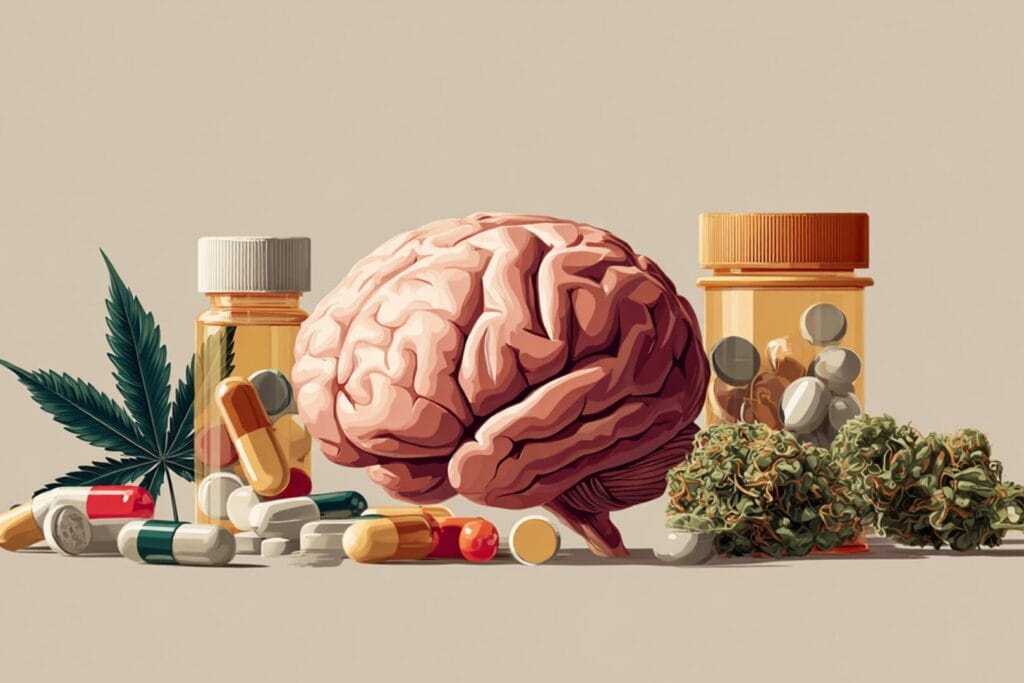Heroin addiction can be an overwhelming and deeply isolating experience affecting every part of a person’s life.
Whether you or someone you love is struggling with this powerful drug, it’s important to know you aren’t alone in this fight. Addiction doesn’t define who you are, and seeking to understand how heroin impacts the body is an important part of taking back control.
The physical, mental and emotional toll of heroin can feel impossible to escape, but with the right information and support, healing is within reach.
We’ll explore how heroin affects the body in the short term and over time. By gaining an understanding of the physical consequences of heroin use, you’ll hopefully be better equipped to recognize its impact and take the necessary steps toward recovery. Knowledge can be a powerful tool in moving forward.
What Is Heroin?
Heroin is a very addictive opioid made from morphine. Morphine is a substance found in the seed pod of some poppy plants. Classified as a Schedule I drug because of the high potential for abuse and lack of accepted medical use, heroin affects the reward system in the brain.
Once used recreationally, heroin can quickly take hold of a user, causing intense cravings and physical dependence that’s difficult to break without professional help.
Heroin comes in forms, including a white or brown powder and a sticky, black substance called black tar heroin.
It’s consumed in a few different ways, each of which can impact the body differently.
- Injection delivers heroin directly into the bloodstream, creating an intense, almost immediate high. There’s a higher risk of overdose that comes with injecting heroin, and there’s also the risk of infections from needle sharing.
- Snorting heroin leads to a slower onset of effects compared to injection but can still cause significant damage to nasal passages over time.
- Smoking lets the drug reach the brain quickly through the lungs, creating a rapid effect similar to injection but with its own set of respiratory risks.
Regardless of the method of use, heroin quickly changes the way the brain and body function, leading to devastating short- and long-term consequences.
Immediate Effects on the Body
In the short term, the effects of heroin include:
Initial Euphoria and Relief
When heroin enters the brain, it binds to opioid receptors, flooding the brain with dopamine. The dopamine surge creates the euphoric high of heroin, often described as a wave of warmth, relaxation and pain relief.
For many, the feeling of escape from physical or emotional discomfort is the driving force behind repeated use. The temporary relief comes at a steep cost, though, as the brain’s reward system is quickly hijacked, leading to cravings and dependency.
Depressed Respiratory System
The initial high may feel euphoric, but heroin has a powerful depressant effect on the body, especially the respiratory system.
It slows down breathing and heart rate, often to dangerously low levels.
The decrease in oxygen flow, known as hypoxia, can lead to short-term consequences like confusion and unconsciousness and, in severe cases, permanent brain damage.
Overdosing on heroin is especially dangerous because breathing can slow to the point of stopping altogether.
Effects on the Central Nervous System
Heroin significantly disrupts normal brain function by interfering with communication between neurons in the central nervous system. The disruption leads to drowsiness, clouded thinking and delayed motor responses.
As the brain struggles to process signals, users often say they experience a heavy, sluggish sensation called “on the nod.”
This may feel like a momentary escape from reality, but it significantly impairs decision-making abilities and motor skills, putting users at risk for accidents, injuries and further health complications.
Short-Term Physical Health Effects
Some of the potential short-term physical effects of heroin can include:
- Nausea and vomiting: Shortly after the drug is taken, many users experience sudden bouts of sickness. This happens because heroin interacts with the brain’s chemoreceptor trigger zone, which controls vomiting.
- Dry mouth and skin flushing: In addition to nausea, heroin use can cause dry mouth and a warm flushing sensation on the skin. Users may notice itching or a dry feeling in their mouth.
- Potential for overdose: One of the most dangerous parts of heroin use is the ever-present risk of overdose.
Long-Term Effects on the Body
Along with the short-term effects above, long-term effects can include:
Physical Dependence and Tolerance
Over time, heroin users develop both physical dependence and tolerance.
Physical dependence means the body has adapted to the constant presence of the drug, and stopping can cause intense withdrawal symptoms.
Tolerance occurs when the body needs increasingly bigger amounts of heroin to get the same euphoric effects.
The dangerous cycle can push users to take more frequent and higher doses, raising the risk of overdose and further damaging the body.
Cardiovascular System
Chronic heroin use takes a toll on the cardiovascular system. Injecting heroin can cause collapsed veins, so it’s hard for blood to circulate properly.
The drug’s impurities can also introduce harmful bacteria into the bloodstream, increasing the risk of serious infections like endocarditis, an infection of the heart’s inner lining.
The conditions can be life-threatening.
Liver and Kidneys
Heroin puts a strain on the liver and kidneys because these organs work to filter toxins from the bloodstream. Over time, this increased burden can lead to liver damage, including conditions like hepatitis or liver failure.
The kidneys can similarly be overwhelmed by the repeated stress, possibly resulting in kidney disease or failure.
Brain Damage
One of the most concerning long-term effects of heroin use is the damage it causes to the brain.
As previously mentioned, repeated hypoxia from slowed breathing during use can lead to cognitive decline and permanent brain damage.
This can manifest as memory loss, impaired decision-making and difficulty concentrating.
Over time, heroin’s effects on brain chemistry can also contribute to mental health disorders.
Reversing the Effects—Seeking Treatment
Seeking help is the first and most crucial step in reversing the damage caused by heroin.
There are several treatment options available, including detox programs to manage withdrawal safely, medication-assisted treatment (MAT) to reduce cravings and therapy to address the emotional and physical aspects of addiction.
No matter how long someone has been struggling with heroin addiction, recovery is possible.
With the right professional care and support, individuals can heal physically and mentally, reclaiming their lives and moving forward in a healthy, positive direction.
If someone you love is affected by heroin addiction, reach out to San Diego Detox today to learn more about available treatment options and start the journey toward recovery.
Frequently Asked Questions
Heroin can be injected, snorted, or smoked; once it enters the bloodstream or lungs, it crosses quickly into the brain and converts into active compounds that act on opioid receptors — producing effects often within minutes.
Short-term effects include an intense rush of euphoria, warmth, pain relief, followed by drowsiness (“on the nod”), slowed breathing, slowed heart rate, dry mouth, skin flushing, nausea or vomiting, and impaired coordination.
Long-term heroin use often causes tolerance (needing more to feel the same effect), physical dependence, and withdrawal symptoms upon stopping. It can also damage the brain’s structure and function — impairing decision-making, memory, and increasing risk of mental health disorders.
While long-term heroin use can cause serious and sometimes lasting damage, recovery is possible. Medically supervised detox, medication-assisted treatment (MAT), and therapy can help manage withdrawal and support healing of both body and mind







